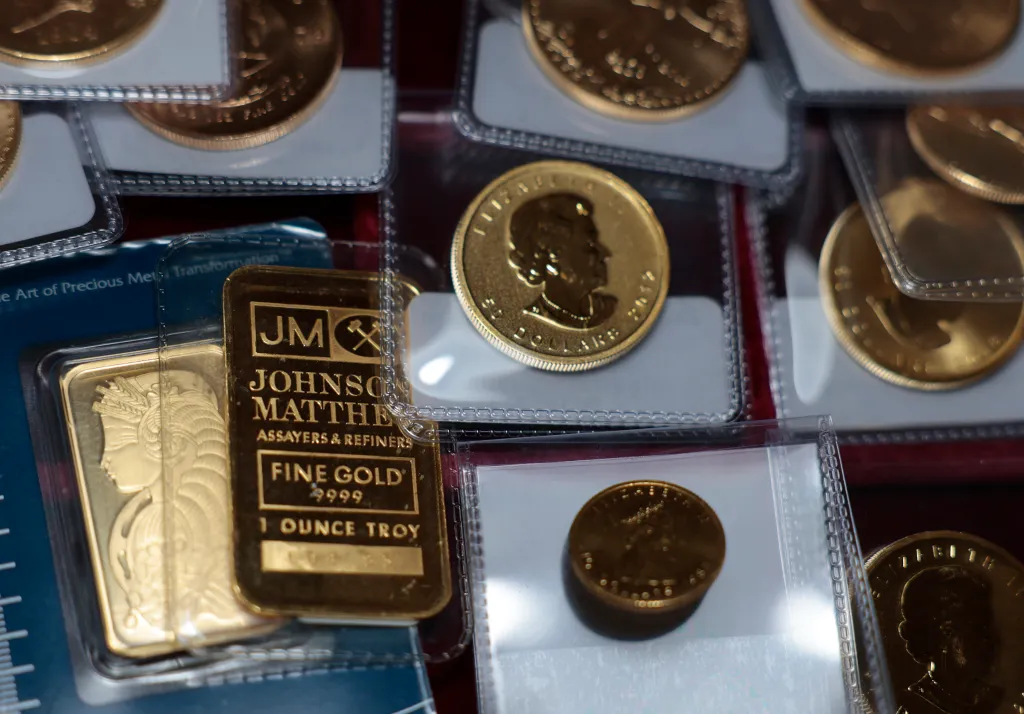Copyright Chicago Tribune

The price of gold has hit one record after another this year, and if the past is any guide, the precious metal’s wild ride means bad news could be on the way. Gold is the doomsday prepper’s favorite commodity, a store of value for difficult times. In the 1970s, gold prices shot up alongside runaway inflation and the end of a system that pegged currencies to the shiny metal. The 2008-09 financial meltdown similarly prompted a spike in demand for gold. In 2020, when COVID-19 shut down the world’s economies, gold prices took off again. It’s almost as if gold is a professional mourner at economic funerals. This time, however, gold’s rise is not due to a dramatic downturn: The U.S. stock market and corporate earnings have held up well this year. Instead, demand for gold is a response to an erosion in the U.S.-led world order that brought about decades of stability and free trade. The current buying spree picked up when President Joe Biden froze the assets of Russia’s central bank in response to the 2022 invasion of Ukraine. Since then, central banks around the world, including those at risk of similar sanctions, have purchased more than 1,000 tons annually. Piling up gold helps to diversify their reserves away from the dollar, giving the U.S. less leverage over them. More recently, China’s central bank took gold purchases to a new level, adding to its reserves every month this year. One of the main reasons behind this move is clear: President Donald Trump and his trade war. For China, and others, stockpiling gold is a hedge against an unreliable economic partner whose unilateral actions have made U.S. Treasury securities a riskier investment than in the past. Gold also is thought to be a hedge against inflation. In the U.S., inflation is relatively tame at about 3%, way below the double-digit levels during the 1970s. Apart from precious metals, most commodity prices are not soaring along with gold. But given the Trump administration’s costly tariffs, and its embrace of deficit spending under the “Big Beautiful Bill Act,” many experts warn it would be no surprise if inflation picks up in the years ahead. Adding fuel to the gold rally, Trump is pushing the U.S. Federal Reserve to lower interest rates to goose the economy in the short-term. Politicizing the Fed would result in inflation and further shake confidence in the dollar, giving central banks one more reason to hold bullion instead of Treasurys. Former Chicagoan Ken Griffin is among those worried about foreign investors hedging their bets on dollar-denominated assets. “I now view gold as a safe-harbor asset in a way that the dollar used to be viewed,” the hedge-fund titan said in a recent interview with Bloomberg. “That’s what’s really concerning to me.” Of course, the U.S. is not alone in contributing to economic worries this year. Russia’s invasion of Ukraine continues, and political crises have erupted in Japan and France, among other countries. Government debt is piling up as political leaders continue to spend beyond their means: Poor fiscal policy makes gold all the more attractive. Apart from the rational explanations for gold’s rise, hype plays a role as well. It has never been easier for investors big and small to hop on the golden bandwagon, and gold fever has attracted widespread speculation across the globe. Jewelers are fielding a stream of customers cashing in unwanted necklaces and rings. Costco is doing a bang-up business selling gold bars alongside rotisserie chickens and toilet paper. Gold-backed funds, gold-mining stocks and gold futures have all attracted new interest. The smaller market for silver, meantime, has staged an even bigger rally than gold this year. Predictably, scams are on the rise along with the gold rush and we urge readers to beware. The FBI recently warned of fraudsters using couriers to collect bulk cash or gold bars from unwitting victims, especially the elderly. Some pose as a grandchild or other relative in legal or medical trouble who needs money immediately. Then a driver shows up at the victim’s location to complete the theft. Scammers also pose as law enforcement agents, or government “help-desk” personnel, telling victims their identities were used in a crime. To prove they weren’t responsible for any wrongdoing, the victims are told to deposit funds or precious metals into a “government-owned” bank. Many people being bilked are too embarrassed to report the thefts to genuine law enforcement agencies. How to avoid becoming a victim? For starters, the government never asks people to purchase gold or other precious metals, so disconnect from anyone who tries that trick. As a rule, don’t click on unsolicited computer pop-ups, links sent via texts, or links and attachments embedded in emails from unknown senders. Don’t let anyone apart from family or trusted friends come along while you withdraw funds or precious metals. And don’t give anything of value to some driver who shows up at the door. Perhaps most important, bear in mind that no investment grows to the sky, gold included. The price already has soared to more than $4,000 per ounce, up by more than double in just a couple of years. Could it keep going up? Maybe, but don’t be shocked — or left vulnerable to financial ruin — if gold prices fall back to earth.



